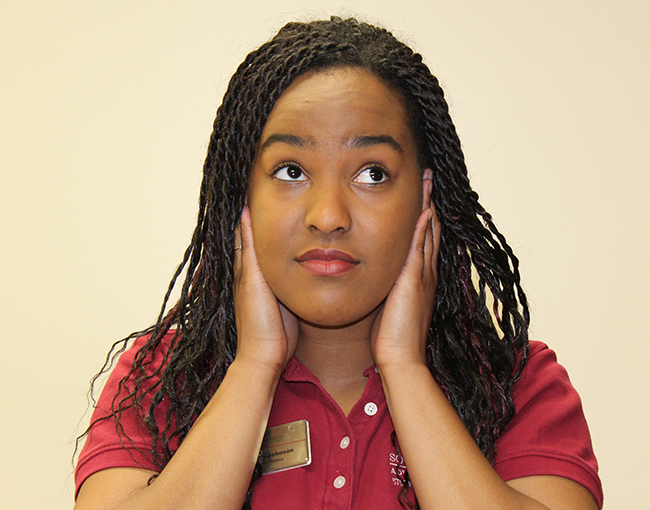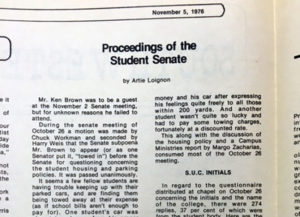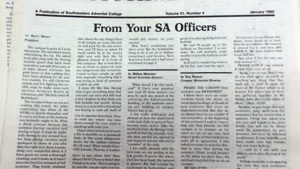The Great Disconnect: Part III Here Are Some Options
 Last semester the Reporting III class examined how effective the student association is in communicating with students at Southwestern Adventist University. And we found a general consensus that there was a problem. After talking to SWAU students, SA officers and their sponsors, we came up with a list that we thought summed up the issues:
Last semester the Reporting III class examined how effective the student association is in communicating with students at Southwestern Adventist University. And we found a general consensus that there was a problem. After talking to SWAU students, SA officers and their sponsors, we came up with a list that we thought summed up the issues:
- There is an acknowledged disconnect in communication between the SA and student body.
- There is general apathy among students regarding the role of the student association.
- The structure for student association officers lacks accountability.
- There’s a tendency for officers to focus on their position rather than how they can serve.
- The SA has a constitution, but few know what it says. We need more emphasis on following it.
- Students—and SA officers—put more emphasis on social activities than anything else. There is more to the SA than what happens on Saturday night.
- SA officers should be more effective in serving as advocates for students.
- It is unclear how much authority the SA has when making decisions.
- SA officers and students need to develop better communication with each other.
- Incoming SA officers need better training.

The Southwesterner in 1976 included news from the recent Student Senate meeting. Should we do that again?
Over the semester we met with students, SA officers and advisors, and with the VP for student services. We expected some of the people we interviewed to challenge these assumptions, but overall this summary was generally accepted. That is a good thing, because often the first challenge is dealing with a problem is accepting that you have a problem in the first place.
The first two articles in this series have dealt with a statement of the problem from the students’ perspective, the reaction by the SA officers and by James The, vice president for student services. This, the final article, will focus on some recommendations on how to fix the problem.
- State of the Union presentations. In going through the SA Constitution, we learned that the student association president is expected to present a State of the Union address to the senate once a year. That meeting is open to the public. We propose that open senate meeting be held at an assembly, so that all students will be at attendance.
- Senate. According to the constitution, the senate is there to “allow students a channel of communication through which their proposals can be presented to the University administration, and through the administration to the Board of Trustees.” Students are familiar with the student association government, but they don’t realize that most of the changes actually occur at the senate level. And while SA meetings are closed to the public, senate meetings, held twice a month, are open. Why aren’t more students attending those meetings? Two reasons: first, apathy. Students feel they have more important things to do than attend senate meetings. Second, they don’t know when and where they are happening. This can be easily rectified by requiring Senate to make a public notice (via announce-l or classified-l perhaps) that a senate meeting is taking place, so that those who have a vested interest can be there.
-
Education and Training. We’ve learned that training for incoming SA officers actually exists, but apparently it’s not enough. Existing and former officers agree that they need to know their responsibilities better, and most are unfamiliar with the constitution, which should be the driving force behind the SA and the senate. It’s time to take a hard look at how they are trained and maybe even require a knowledge test of their office responsibilities at the beginning of the academic year.
- Media. From 1963 to 1999, the official SA publication at Southwestern was a newspaper called The Southwesterner. In 1999, the editor of The Southwesterner decided to stop publishing a newspaper and start printing a lifestyle magazine for the SWAU SA entitled Status. During the era of The Southwesterner, SA officers used it to report what was going on in their areas and speak about issues related to students. In addition, students could express their concerns through letters to the editor. Today, students have access to two publications. Status continues to be published in paper form on campus as the official publication of the SA. In addition, the communication department currently publishes The Southwesterner as an online newspaper. Both provide avenues for better communication. I propose that (1) S.A. officers use these two publications to write articles and produce videos and podcasts that can be shared with students regarding issues of interest to them; (2) students take advantage of these publications to express concerns about what is going on in their senate and student association; and (3) both publications take efforts to provide more coverage of senate and student association actions and activities, extending beyond just social activities.
- Student Input. In our research, we were surprised to find an editorial in a 1978 Southwesterner complaining about student apathy. What that confirms for me is that regardless of how unique students think they are, their issues are not new. And if they are not new, it is likely that someone has found solutions in the past as well. The solution to apathy is involvement. If you don’t like what’s happening, work to change it. Senate and SA needs to hear your opinions. It is up to the SA to speak to you, but just as importantly, it is up to YOU to speak your mind to them. There’s been a prevailing attitude on campus for the past couple of years that students don’t have the right to speak their mind, that if they do, they get shut down. We would like to propose that it’s not a matter of speaking your mind, but how one goes about doing it that creates problems. It’s important that we set up very obvious ways for students to speak their minds and share ideas, concerns and positives when they feel they want and need to. That might come in the form of meetings, suggestions boxes, call-in phone lines, comments pages on publications or a variety of other methods. But in any case, it needs to happen.
This project started off as our first attempt at investigative reporting on a campus that had never seen such a thing. There was a little bit of apprehension as to where this project would lead us, but we were determined to let truth be our guide. What we found was that by pursuing truth, we could do good things. Acting as the “watchdog” for an organization or a government doesn’t have to end with negative results, but can end with growth and positive change. We are hoping that what we have discovered from this project will help Southwestern Adventist University and its Student Association serve its students more effectively in the future.
About author
You might also like
Health Services Hosts Open House
Share this:
Scriven to Speak on Darwinism for Saxon Series
The popular discussion of Darwinism is too narrow, according to Charles Scriven, president of Kettering College of Medical Arts. Scriven is the speaker for the second lecture in Southwestern Adventist
Hockey Intramurals (Multimedia)
Students in the Photojournalism created an audio slideshow featuring floor hockey intramurals at Southwestern. Share this:







0 Comments
No Comments Yet!
You can be first to comment this post!